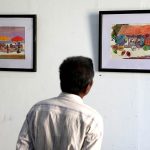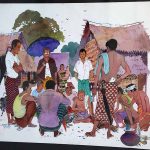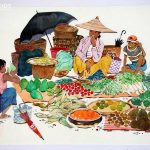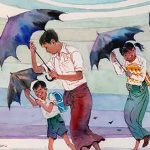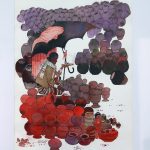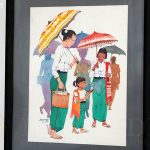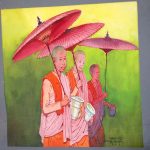The Irrawaddy Magazine |
- EU Pledges to Continue Supporting Education Despite Calls for Ties to be Cut Over Rakhine Crisis
- Pope Francis Arrives in Bangladesh in Shadow of Rohingya Crisis
- ‘I Prefer Women Participate Not Because of a Quota but Because of Their Ability’
- DASSK’s China Trip Expected to Focus on Security, Development
- ‘The Umbrellas’ Exhibition Turns Everyday Objects into Art
- Surin Pitsuwan Dies at 68
- AA, Myanmar Army Clashes Likely to Intensify: Arakan Army Spokesman
- Rakhine Lawmakers Call for Maungdaw to be Segregated Along Religious Lines
- Farmers Arrested in Shan State Facing Four Charges
- Vatican Defends Pope’s Avoidance of Term ‘Rohingya’ in Myanmar
- Indonesia Reopens Bali Airport as Wind Clears Volcanic Ash
- KIA Reports Frequent Clashes with Tatmadaw Throughout November
| EU Pledges to Continue Supporting Education Despite Calls for Ties to be Cut Over Rakhine Crisis Posted: 30 Nov 2017 06:00 AM PST YANGON—The European Union will continue investing in Myanmar's education system to help bring about change and to support the country's democratic transition, the EU ambassador to Myanmar said on Thursday. "The European Union recognizes that education for all, without discrimination, is an indispensable prerequisite for Myanmar to succeed (in) its democratic transition," Ambassador Kristian Schmidt said at a regional conference on cooperation in higher education held in Yangon to promote the EU's Erasmus+ academic exchange program. The European Union has allocated more than 240 million euros to support the Myanmar government in its effort to reform the education sector, the ambassador said in his speech. In early November, the London-based weekly Times Higher Education reported that international universities were being pressured to cut ties with Myanmar universities due to the recent crisis in Rakhine State, where militant attacks and a subsequent military clearance operation led to the displacement of more than 600,000 Rohingya Muslims to neighboring Bangladesh. Myanmar academics and educators responded to the news with appeals that cutting international ties would worsen the situation in Myanmar while bigotry and prejudice would not go away. "We are going ahead with the mutual understanding that investing in education is the only way to achieve structural change, better living conditions and ultimately a sustainable democracy in this country," Schmidt stressed at the conference. The Danish diplomat also emphasized that Myanmar needs its own human resources to improve its economic fortunes and the EU is planning to provide support to ensure Myanmar children even in the most remote and undeveloped areas of the country had access to good schools and the opportunity to learn a profession.  Myanmar Education Minister U Myo Thein Gyi, who was present at the conference, said that his ministry had been investing in youth to help them build sustainable futures and to create life-long opportunities for continuous professional development, adding that internationalization had to be enhanced in the country's higher education sector. "Our country needs human resources with a solid work ethic … who take responsibility and accountability for the work they do and who are globally collaborative and competitive," the minister said. In an interview with The Irrawaddy, Professor Dr. Aung Kyaw, pro-rector of the University of Yangon, Myanmar's oldest university and at one time one of the most prestigious institutions of higher learning in Asia until the 1962 coup by Gen. Ne Win, expressed his personal opinion that cutting educational ties won't resolve any problems. "Education is a national issue, not individual. [People in] the country have been facing different kinds of challenges due to a lack of education. There won't be such challenges if they are all well-educated," the professor said. Yangon University was closed for undergraduate study for 26 years, reopening only under the administration of the previous U Thein Sein government in 2013. The post EU Pledges to Continue Supporting Education Despite Calls for Ties to be Cut Over Rakhine Crisis appeared first on The Irrawaddy. |
| Pope Francis Arrives in Bangladesh in Shadow of Rohingya Crisis Posted: 30 Nov 2017 05:06 AM PST DHAKA — Pope Francis landed in Bangladesh on Thursday after a diplomatically sensitive trip to mainly Buddhist Myanmar, where he made no direct reference to the plight of Rohingya Muslims who have fled to Bangladesh in their hundreds of thousands. The pope’s trip to mostly Muslim Bangladesh is likely to be less sensitive though his words will be closely watched following his decision not to use the word “Rohingya” in public during his four-day Myanmar trip to avoid a diplomatic incident with the country some have accused of ethnic cleansing. On Friday, the pope is expected to meet a group of Rohingya refugees from among the roughly 625,000 who have fled to Bangladesh from neighboring Myanmar since the end of August. “He did not even pronounce the word ‘Rohingya’ in Myanmar,” H.T. Imam, Bangladesh Prime Minister Sheikh Hasina’s political adviser, told Reuters on Thursday. “Here we would be looking forward to what he says.” Bangladeshi President Abdul Hamid welcomed the pope at Dhaka airport. Hamid and the pope were both due to make speeches later in the day and to raise the refugee crisis. The Vatican on Wednesday said the pope’s moral authority was unblemished by his failure to refer to the persecuted Myanmar Muslim minority by the name they chose to identify themselves by, and his mere presence drew attention to the refugee crisis. But a Vatican news conference in the Myanmar city of Yangon to wrap up the visit only served to highlight the diplomatic minefield that the issue had presented for Francis. Vatican spokesman Greg Burke said the pope’s decision not to refer to the Rohingya did not take away from anything he had said in the past — he had mentioned them and their suffering before his Myanmar visit — but added that Vatican diplomacy was “not infallible” and others were entitled to their views. ‘WORLD INFLUENCE’ The exodus of Rohingya people from Rakhine state to the southern tip of Bangladesh was sparked by a military crackdown in response to Rohingya militant attacks on an army base and police posts on Aug. 25. Scores of Rohingya villages were burnt to the ground, and refugees arriving in Bangladesh told of killings and rapes. The United Nations has accused Myanmar of ethnic cleansing and last week Washington said the military’s campaign included “horrendous atrocities” aimed at “ethnic cleansing”. Myanmar’s military has denied accusations of murder, rape and forced displacement. The government blames the crisis on the Rohingya militants, whom it has condemned as terrorists. Many people in Myanmar regard the largely stateless Rohingya as illegal immigrants from Bangladesh. They are excluded from the 135 “national races” recognized by law, and even using the name is considered inflammatory. Although Francis avoided the term, following the advice of local Church officials who feared it could turn Myanmar’s military and government against minority Christians, his calls for justice, human rights and respect were widely seen as applicable to the Rohingya. Francis held talks in Myanmar with government leader Aung San Suu Kyi, a Nobel peace laureate and longtime champion of democracy who in 2016 formed Myanmar’s first civilian government in half a century. In Bangladesh, several Rohingya told Reuters they hoped the pope would use his influence to help them go back to Myanmar and to get rights. Myanmar and Bangladesh signed an accord last week on terms for the return of Rohingya, though rights groups have expressed doubts about Myanmar following through on the agreement and have called for independent observers for any repatriation. There are concerns about protection for Rohingya from further violence if and when they go home, and about a path to resolving their legal status — most are stateless — and whether they would be allowed to return to their old homes. Bangladesh hopes the pope’s intervention can help, the prime minister’s adviser said. “The general perception is that he is a man of peace and he has world influence,” Imam said. “The pope internationally has his own image and that is something that could perhaps influence events." The post Pope Francis Arrives in Bangladesh in Shadow of Rohingya Crisis appeared first on The Irrawaddy. |
| ‘I Prefer Women Participate Not Because of a Quota but Because of Their Ability’ Posted: 30 Nov 2017 03:58 AM PST The ruling National League for Democracy (NLD) formed a Central Women's Committee on Aug. 21 with a view to promoting women's empowerment and capacity building. Dr. May Win Myint, chairwoman of the committee as well as a lawmaker representing Mayangone Township in the Lower House, recently talked to The Irrawaddy's May Sitt Paing about the objectives and activities of the committee What has the Central Committee done since it was formed two months ago? Though the committee was formed [officially] on Aug. 21, it has been in existence for a long time before that. The committee was reformed with 11 members to engage in public works. Firstly, it went to camps for internally displaced persons [IDPs] in Myitkyina, Waingmaw, Mohnyin, and Mogaung townships in Kachin State. There, women and children are suffering the most. Some camps are well run and some aren't. Camps supported by Christian associations were good, I mean, they helped IDPs get jobs. The [situation in] camps in Mohnyin was not so good. What are the main concerns of the women and children in the IDP camps? They are worried about two things. They have been in the camps for more than six years. They have left behind their farms, and they are worried they will lose them. But they dare not go back because of landmines. So, we told them that they could ask the authorities to get back their land. And as for the landmines, it has been on the mind of Daw Aung San Suu Kyi for a long time. But it will take time. We also visited Buthidaung and Maungdaw in Rakhine State recently. Displaced persons have already gone back to their villages from camps. We plan to open a clinic in an ethnic village in Maungdaw. I heard that the committee is planning to form women's committees at the district, township, ward and village levels. Has there been any progress on that? We'll invite any female member healthy, willing and able to perform assigned duties, regardless of their educational background and age, to join the committee. We plan to form committees at the ward and village levels by January, township level by February, and district level by March. The Central Committee will appoint district and region/state level committees. You are also a lawmaker in the Lower House. What legislation do you plan to submit to Parliament to promote women's rights? It is the responsibility of Parliament. A draft law to prevent violence against women has been in the making for over three years. But, it has not yet reached Parliament. The Upper House has a Women and Children Protection Committee, but the Lower House still does not have such a committee. So, we will form one as quickly as we can. And we are also amending the Child Law to further protect young girls. We'll also try to change certain laws like the Suppression of Prostitution Act in order to protect women. I heard that civil society organizations are discussing those laws and draft laws. But if they can do it quickly and forward them to Parliament, the bill committees will be able to start discussion soon and the process will be accelerated. What do you think of the efforts being made under the new government to empower women? Women lawmakers accounted for only 3.8 percent of lawmakers in the previous government. The percentage has increased under the new government, but it is still relatively low. According to CEDAW [Convention on the Elimination of All Forms of Discrimination against Women], women should have a 30 percent representation [in politics]. Our party doesn't practice a quota system. But our policy favored woman candidates when they had the same abilities as their male counterparts [in selecting candidates for the 2015 election]. As a result, the NLD has the largest female representation among political parties in parliament. Some women are too timid to take a lead role. What would you say about that? Some women are afraid to do so, and some prefer men to take the lead role. So, we have to mobilize women to come out to the front. Only by doing this, will more women gradually come out to contest elections. Previously, there were no female administrators, but now there are 87. This is in the administrative branch. We also plan to rally women to obtain greater representation in the legislative branch. In Parliament, we will try to get women to take lead roles in the legislative, executive and judicial branches. How would you respond to criticism that some women's rights activists have been less active since they entered Parliament and that female representation is low in the Parliament? It depends on the policies of the concerned parties. It is important that political parties have a large number of female candidates, and they have policies that favor female candidates. But at the same time, women have to build up their capacities. So, we will form women's committees at the ward and village levels and provide capacity-building training. Only then, will women's voices rise. People are talking more about gender equality these days and there have been greater calls for legislation that promotes gender equality. What are your suggestions? Much remains to be done in that regard. When it comes to gender equality, most activists talk in international terms. I won't say they are wrong, but different countries have different situations. International norms call for a 30 percent participation rate for women [in politics]. But I prefer that women participate not because of a quota system but because of their ability. Women have to try to improve themselves. Women account for 51 percent of the total population of our country. We'll empower women at the ward and village levels and help enhance their capacities. Hopefully, there will be more female lawmakers in 2020. There are rigid attitudes and stereotypical views about women. Will it be easy to change certain things? Such attitudes are entrenched more deeply in ethnic areas, and they may be less prevalent in lower Myanmar. Some people simply can't shed such conservative attitudes. But as there are more ethnic parties, perhaps they will be able to help them get rid of those attitudes. We will carry out educational campaigns because there are cases in which women are sexually exploited because they have been misguided and such cases happen not only in rural areas but also in areas close to urban areas, for instance, the case in Mon State. The post 'I Prefer Women Participate Not Because of a Quota but Because of Their Ability' appeared first on The Irrawaddy. |
| DASSK’s China Trip Expected to Focus on Security, Development Posted: 30 Nov 2017 03:53 AM PST YANGON — State Counselor Daw Aung San Suu Kyi left for China on Thursday at the invitation of the Chinese government to deliver a speech "as a special guest" at a forum of world political leaders in Beijing hosted by the Communist Party of China. The forum will run from November 30 to December 3. A news release from the State Counselor's Office says the trip is both a working and goodwill visit during which she will have a bilateral meeting with Chinese President Xi Jinping. With the ministers of electricity, energy and construction and other government officials in tow, the trip marks the second time the state counselor has visited Myanmar's large neighbor to the north. In May she attended the Belt and Road Forum for International Cooperation at the China National Convention Center in Beijing. She held separate talks with President Xi and Premier Li Keqiang at the time. Yangon-based political observer Yan Myo Thein said the visit was significant as few of the country's previous leaders visited China twice in one year. He said given the ministers accompanying Daw Aung San Suu Kyi, bilateral discussions would likely focus on projects related to China's One Belt, One Road initiative. During their private meeting, the two leaders are also likely to discuss efforts to stabilize border areas where some of Myanmar's largest ethnic armed groups have been fighting with the national army; China's continued support for Myanmar's reconciliation and peace process; and the crisis in Rakhine State, where China has large business projects including a deep-sea port and a crude oil pipeline connecting western Myanmar's Kyaukphyu Township and Kunming, the capital of China's southern Yunnan Province. Since the recent instability in Rakhine State, where the army has faced international condemnation for clearance operations that have triggered an exodus of more than 600,000 Muslim Rohingya to Bangladesh, China has expressed its support for Myanmar. When the issue was raised at a meeting of the U.N. Security Council in September, China voiced support for the army's efforts "to uphold peace and stability" in Rakhine. On a trip to China in mid-November, Myanmar military chief Senior General Min Aung Hlaing also met President Xi, who said the general's goodwill visit to China was significant, that relations between the two countries had reached their highest point and that China would continue providing necessary assistance to Myanmar. The post DASSK's China Trip Expected to Focus on Security, Development appeared first on The Irrawaddy. |
| ‘The Umbrellas’ Exhibition Turns Everyday Objects into Art Posted: 30 Nov 2017 03:48 AM PST Have you ever noticed how umbrellas are used in Myanmar? Perhaps, you have seen umbrellas as sacred objects atop glittering pagodas or used by roadside vendors to create shade or shield their customers from the rain. Umbrellas are an everyday objects, which not many artists would use as the subject of their exhibitions. But Maung Thiha showcases his show 'The Umbrellas' at Lokanat Galleries in Yangon. 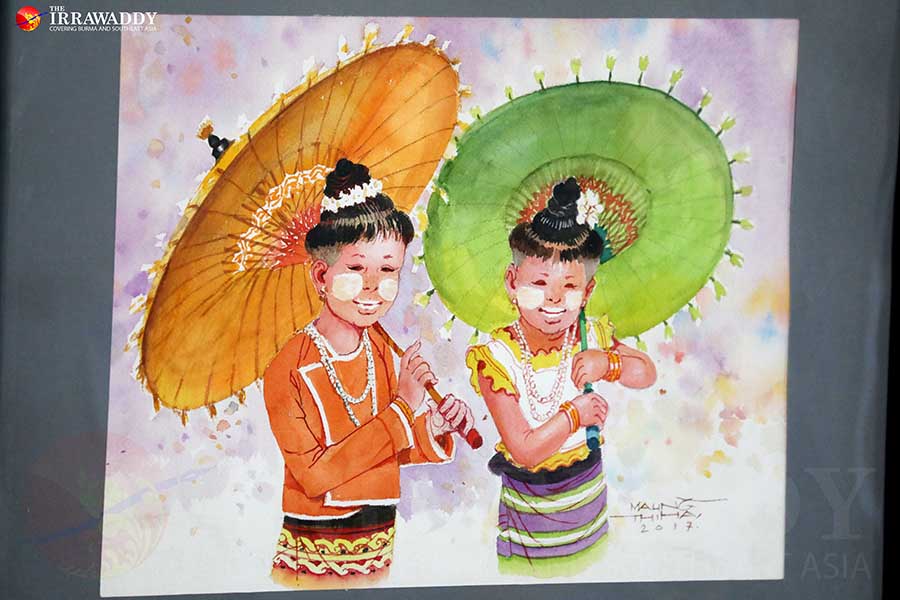 On canvas, Maung Thiha has painted colorful umbrellas that were stored in his memories. His exhibition reminds us of all the ways umbrellas are utilized in Myanmar. Of course, umbrellas are used to cover oneself against sun and rain. But parasols made in Irrawaddy's capital city are known for their flowery patterns and decorative purposes. Gold-colored umbrellas are used in Buddhist novitiation ceremonies, and are typical of them. Small paper umbrellas are used as offertories at pagodas as well as for astrological purpose to avert bad luck. And stationary parasols are used by street vendors. 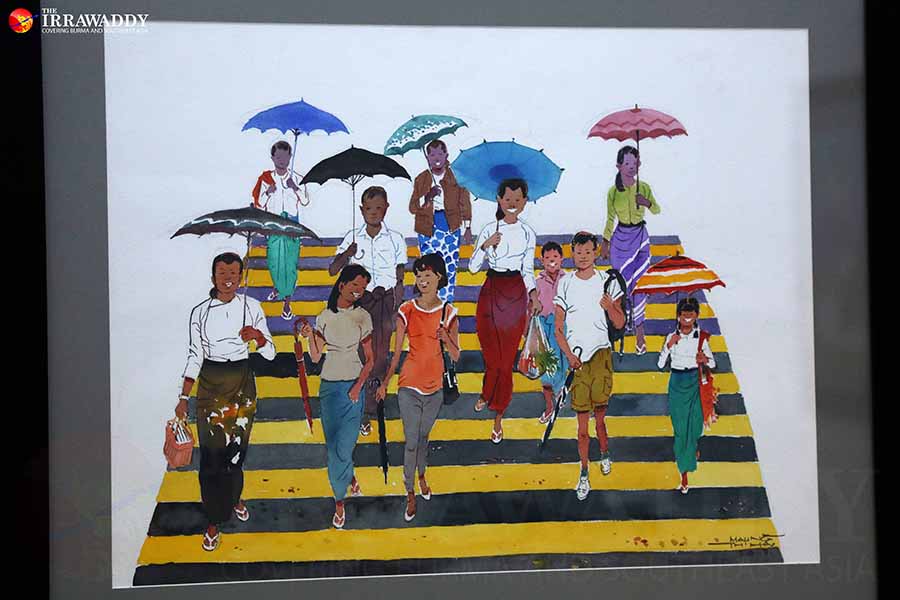 "Umbrellas are necessary in Myanmar society. I always see students and novices walk past my house holding umbrellas. And there are also umbrellas in markets. In my trips across Myanmar, I also saw umbrellas bearing local crests. So, I got the idea of organizing an umbrella series," said Maung Thiha. A graduate of the Mandalay State School of Fine Arts, he has participated in group exhibitions since 1975 and showcased his paintings in foreign countries like Hong Kong and Thailand. From 1999 to 2016, he organized five solos, and his sixth solo 'The Umbrellas' showcases 26 paintings priced between US$150 and $450. 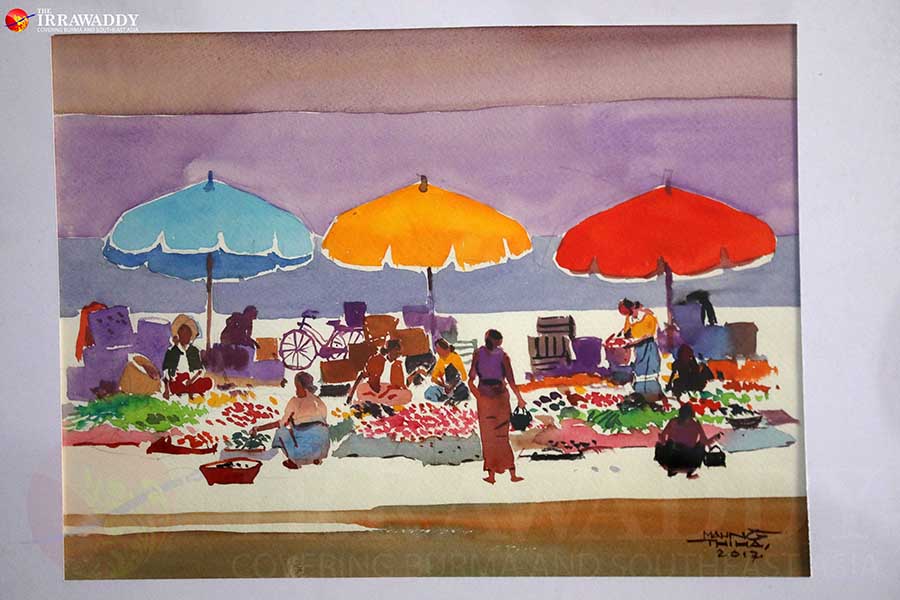 "I have a lot more umbrellas that I can think of but haven't painted. Umbrellas are used differently in different places. It will take time to paint them all," he said. His paintings will be on display until Monday. The post 'The Umbrellas' Exhibition Turns Everyday Objects into Art appeared first on The Irrawaddy. |
| Posted: 30 Nov 2017 02:51 AM PST Former foreign minister and Asean secretary-general Surin Pitsuwan died of an acute heart attack on Thursday. He was 68. He was rushed to Ramkhamhaeng Hospital and later pronounced dead. Surin was born on Oct. 28, 1949 in Muang district, Nakhon Si Thammarat. He graduated from Claremont College in California in political science in 1972 and earned a master’s degree from Harvard University. He entered politics in 1986 as a Democrat Party candidate and won a seat in his hometown in Nakhon Si Thammarat in all contests from 1986 to 2005. Surin was the deputy foreign minister from 1992-95 and rose to become the foreign minister from 1997 to 2001 under the premiership of Chuan Leekpai. He was the first Thai to become the Asean secretary-general during which he served in Jakarta in 2008 for a five-year term before rejoining the Democrat party. A former Bangkok Post columnist, Surin was a speaker at the Bangkok Post Forum on Nov. 16 this year. He was expected to run for Bangkok governor when elections are allowed. The funeral will be held at the Tha It Mosque in Pak Kret district, Nonthaburi province, on Friday. The post Surin Pitsuwan Dies at 68 appeared first on The Irrawaddy. |
| AA, Myanmar Army Clashes Likely to Intensify: Arakan Army Spokesman Posted: 30 Nov 2017 12:34 AM PST NAYPYITAW — The ongoing clashes between the Myanmar Army and the Arakan Army (AA) are likely to intensify in the coming days, said Khaing Thukha, a spokesperson for the AA, alleging that the Myanmar Army recently launched a large-scale assault utilizing more than 30 battalions in Chin's State Paletwa Township near the Myanmar-India border. On Wednesday, he said, there were clashes in six places for the whole day and the Tatmadaw (Myanmar Army) used two helicopters to attack. "Fierce clashes are ongoing in Paletwa at the border of India, Bangladesh and Myanmar. Clashes are quite fierce, and the Tatmadaw suffered casualties," Khaing Thukha told The Irrawaddy. "If they continue fighting like this, we will inevitably have to defend ourselves, and the clashes will only intensify," he added. The AA has suffered at least five casualties and some injuries in clashes that broke out in early November, said Khaing Thukha, suggesting that the Tatmadaw might have suffered many more casualties and injuries. He refused to disclose, for security reasons, when the AA started its military activities in Paletwa. Around 350 Paletwa locals fled across the border to India out of fear after the Tatmadaw bombed AA troops on Wednesday evening, said U Pinnya Jota, a Buddhist monk living in India. The monk told The Irrawaddy on Thursday, there are now around 2,000 Paletwa residents taking shelter at the border in India including some 1,500 people who fled last week. "Arakanese villages are providing as much aid as they can. The Indian government has given some rice to them. Around 350 people arrived yesterday [Nov. 29]. They fled after [the Tatmadaw] bombed, around 4:30 p.m. yesterday," said U Pinnya Jota. Military leaders have repeatedly said that the Tatmadaw would not hold peace talks with the AA unless it disarmed because it was established only after Myanmar had elected a quasi-civilian government, under former President U Thein Sen in 2011. [The AA, which took part in fighting by allying with Kachin, Ta'ang and Kokang troops in the Kachin Independence Army controlled areas in northern and northeastern Myanmar, has said its troops have been mobilized since 2009.] Locals speculated that the Tatmadaw's ongoing attacks were retaliation after it lost 11 troops—two officers and nine other ranks—in an AA ambush on Nov. 18 in Chin State's Paletwa Township. According to the AA, clashes have been ongoing near Myeik Wa, [a border village near India], since Nov. 25, and there were also clashes at the triangle area at the border of Myanmar, Bangladesh and India on Wednesday. The AA said it seized two 60 mm launchers, 70 pieces of 60 mm mortar shells, some ammunition and military equipment [of the Tatmadaw] in clashes on Wednesday. Translated from Burmese by Thet Ko Ko. The post AA, Myanmar Army Clashes Likely to Intensify: Arakan Army Spokesman appeared first on The Irrawaddy. |
| Rakhine Lawmakers Call for Maungdaw to be Segregated Along Religious Lines Posted: 30 Nov 2017 12:23 AM PST YANGON – Rakhine State legislators on Monday urged visiting Union Minister for Social Welfare Dr. Win Myat Aye to ensure Muslim and Rakhine communities in the conflict-torn Maungdaw region would be segregated before the repatriation of refugees begins from neighboring Bangladesh. The informal consultation marked the first time Union government and state-level lawmakers from the Rakhine Parliament had met since the National League for Democracy assumed power in 2016. According to lawmakers, the meeting lasted for half an hour. One of the attendees, independent lawmaker Than Maung Oo, told The Irrawaddy that the meeting was led by Chief Minister U Nyi Pu, Dr. Win Myat Aye, who also serves as chair of the Union Enterprise for Humanitarian Assistance, Resettlement and Development (UEHRD) in Rakhine, and State Parliament Speaker San Kyaw Hla. The Myanmar Army launched an offensive against the Arakan Rohingya Salvation Army (ARSA) in reprisal for a series of attacks on Maungdaw border outposts by ARSA units in late August. However, the harsh response by the army resulted in more than 600,000 Rohingya refugees fleeing to neighboring Bangladesh. Last week, Myanmar and Bangladesh signed a memorandum of outstanding (MoU) on refugee repatriation although the details have yet to be released. During the meeting, regional lawmakers raised questions regarding the repatriation timeframe, the resettlement process and the central government's plans for infrastructure development in the region. However, Dr. Win Myat Aye was unable to provide precise answers to their queries. The regional lawmakers then discussed their opinions on refugee relocation. "We asked the Union minister where they would relocate the Bengali [Rohingya] Muslims but he could not answer us," Than Maung Oo said. The lawmaker said he made four suggestions to the union minister concerning the repatriation and rehabilitation project, stressing that the government needed to make law enforcement its top priority by reserving southern Maungdaw for non-Muslims and settling the Rohingya Muslim refugees in the northern part of the district. "No one wants to live with Bengalis in the same location. It's impossible," Than Maung Oo said. He said that keeping the two communities apart would prevent conflicts as well as future attacks on security forces, adding that the government needed to specify precise locations for internally displaced non-Muslim people as well. Moreover, he demanded the Union cabinet create agricultural and livestock zones for poor ethnic Arakanese as part of a rehabilitation project to stop them from leaving Maungdaw. In addition, state parliamentarians advised the chief minister and Union minister to ensure 40 billion kyat contributed by Burmese tycoons and the international community to the UEHRD was used effectively for rehabilitation of northern Rakhine State — as corruption was widespread in the area. U Mya Than, deputy speaker of Rakhine State Parliament, said that the Union minister also raised the issue of domestic businesses seeking to invest in infrastructure projects, including housing and apartments in northern Rakhine State, although no firm details were provided by the minister. "There is a lack of collaboration not only between the state government and the Rakhine parliament on the ground but between the union government and elected Arakanese lawmakers as well," U Mya Than said. On Monday Chief Minister Nyi Pu posted explanations to the lawmakers' queries on his Facebook page, stating the government had established four working committees for resettlement and socioeconomic development to come up with a plan to address the devastation caused in northern Rakhine. Under the oversight of the UEHRD, the government also formed nine working committees with local businesspeople to manage development projects. Nyi Pu's statement says, "As a member of the United Nations, we (Myanmar) cannot ignore related international procedures" and "(the government) will prioritize the public interest practically." The Union minister, Dr. Win Myat Aye, and the chief minister could not be immediately reached for comment. The post Rakhine Lawmakers Call for Maungdaw to be Segregated Along Religious Lines appeared first on The Irrawaddy. |
| Farmers Arrested in Shan State Facing Four Charges Posted: 29 Nov 2017 10:54 PM PST CHIANG MAI, Thailand – Eight of nine farmers, including a 12-year-old boy, arrested by the Myanmar military four months ago in Ho Pong Township in southern Shan State are facing trial over a combined four charges, according to their lawyer. The eight appeared at the Ho Pong Township court on Wednesday, their latest appearance since their arrests in July and August. "They are charged under the Communication Law for possessing walkie-talkies, the Export and Import Law for driving an unlicensed vehicle, the Arms Act for possession of hunting rifles, and the State Protection Law for trespassing in a military operation zone," Sao Mya Wadi, their lawyer, told The Irrawaddy. She said the charges were filed in September. "The court has finished hearing from the witnesses in some cases, because each [suspect] is charged with two to three charges mentioned above. But there need to be more hearings for the remaining cases. The accused will have to appear before the court again on Dec. 6," she said. The Shan Human Rights Foundation (SHRF), a rights group based in Thailand, says the farmers were wrongly arrested and called for the charges to be dropped. In a statement issued Tuesday, the SHRF said the eight adults and one boy were arrested by the Light Infantry Battalion 424 and Infantry Battalions 225 and 249 between July 15 and August 4 on suspicion of links to a Shan armed group, the Restoration Council of Shan State/Shan State Army South (RCSS/SSA-S). The arrests came a day after a clash between the RCSS/SSA-S and Tatmadaw troops in July; the RCSS is a signatory of the nationwide ceasefire agreement (NCA). The boy was released on bail on Aug. 5, three weeks after his arrest. The adults are being detained by Ho Pong police. One of the eight adults, Lung Aw Na, remains in police custody but has yet to be charged, according to the SHRF. "We would like to request that the cases be dropped because they are innocent farmers," said Sai Hor Hseng, the SHRF spokesman, adding that such arrests should not occur while the country is in the midst of a peace-building process. "The nine farmers were arrested for possession of items such as walkie-talkies, mobile phones, hunting rifles and bullets, even though these items are used by local villagers for everyday purposes," the group's statement says. Their lawyer said that if her clients were convicted for possessing walkie-talkies and hunting rifles then many more innocent villagers could also be arrested. "They [the Tatmadaw] could have arrested thousands of them, because almost everyone in the villages possesses hand-held communication devices and villagers can make these homemade hunting rifles and gunpowder," said Sao Mya Wadi. "It is important that the judgments are made based on good conscience. There must be justice and equity for all human beings," said added. The SHRF says the court proceedings are being delayed by the Tatmadaw's plaintiffs' lack of cooperation, frequently failing to show up in court because, it says, they lack the evidence to prove their case. There are currently no clashes in the area. But Sai Hor Hseng said locals have witnessed the deployment of more Tatmadaw troops. "More and more Burma soldiers have gone into the areas and have taken positions," he said. The post Farmers Arrested in Shan State Facing Four Charges appeared first on The Irrawaddy. |
| Vatican Defends Pope’s Avoidance of Term ‘Rohingya’ in Myanmar Posted: 29 Nov 2017 09:12 PM PST YANGON — The Vatican on Wednesday defended Pope Francis's decision not to use the word "Rohingya" in public during his visit to Myanmar, saying his moral authority was unblemished and that his mere presence drew attention to the refugee crisis. But at a news conference, the Holy See's spokesman also acknowledged that Vatican diplomacy was "not infallible" and that others were entitled to their views. The pope leaves on Thursday for Bangladesh, where about 625,000 Muslim Rohingya from predominantly Buddhist Myanmar have fled following a military crackdown in Rakhine State. He is due to meet Rohingya refugees there. Since he arrived in Myanmar, Francis has studiously avoided the highly charged term, following advice of local Church officials. They feared it could set off a diplomatic incident and turn Myanmar’s military and government against minority Christians. Even though his calls for justice, human rights and respect were widely seen as applicable to the Rohingya, who are not recognized as citizens or as members of a distinct ethnicity, rights groups such as Amnesty International said they were disappointed. "I think it was pretty clear from the local concerns that the pope was going to take the advice very seriously in public," Vatican spokesman Greg Burke said at the news conference, which was also with several Myanmar bishops. "That doesn’t take away from anything the pope has said in the past, or from anything he says in private," Burke said. "The fact of the matter that the pope is here and draws attention to the country itself is an incredibly positive thing." Scores of Rohingya villages were burnt to the ground, and refugees arriving in Bangladesh told of killings and rapes. Washington said last week that the military's campaign included "horrendous atrocities" aimed at "ethnic cleansing." Myanmar's military has denied accusations of murder, rape and forced displacement. The government blames the crisis on the Rohingya militants, whom it has condemned as terrorists. Vatican Diplomacy Not Infallible "Everyone's entitled to their own opinion here. Nobody ever said Vatican diplomacy's infallible," Burke said when asked if the Vatican had any second thoughts about the decision for the pope not to use the word. He said the aim of Vatican diplomacy was "building bridges" and seeking discussions as "brothers, which often take place behind closed doors." This suggested the pope, who has defended Rohingya by name before in Rome, may have used the term in private during meeting in Myanmar. The pope, Burke said, was "not afraid of minefields," but he could not just "parachute in" to areas to solve crises. "I find it really hard to think that the moral authority of the pope has somehow diminished. People are not expected to solve impossible problems," Burke said. "The morals of the pope stand. You'll see him go ahead and you can criticize what is said and what is not said, but the pope is not going to lose moral authority on this question," he said. Asked about the accusations of ethnic cleansing, Bishop John Hsane Hgyi said "I did not see it with my own eyes. I don’t know if its true or not." When she came to power in 2016, Nobel peace laureate and longtime champion of democracy Daw Aung San Suu Kyi said her top priority was ending ethnic conflicts that have kept Myanmar in a state of near-perpetual civil war since independence in 1948. That goal remains elusive and, although Daw Aung San Suu Kyi remains popular at home, she has faced a barrage of international criticism for expressing doubts about reports of rights abuses against Rohingya and failing to condemn the military. Although Daw Aung San Suu Kyi formed Myanmar's first civilian government in half a century, her defenders say she is hamstrung by a constitution written by the military that left the army in control of security and much of the apparatus of the state. The military's power was clear on Monday when its leader, Senior General Min Aung Hlaing, demanded to meet the pope before Daw Aung San Suu Kyi, upending the planned schedule, which had her meeting the pontiff first. "I'm sure the pope would have preferred meeting the general after he had done the official visits," Burke said. The post Vatican Defends Pope's Avoidance of Term 'Rohingya' in Myanmar appeared first on The Irrawaddy. |
| Indonesia Reopens Bali Airport as Wind Clears Volcanic Ash Posted: 29 Nov 2017 09:05 PM PST DENPASAR, Indonesia — The airport on the Indonesian holiday island of Bali reopened on Wednesday as wind blew away ash spewed out by a volcano, giving airlines a window to get tourists out while authorities stepped up efforts to get thousands of villagers to move to safety. Operations at the airport – the second-busiest in Indonesia – have been disrupted since the weekend when Mount Agung, in east Bali, began belching out huge clouds of smoke and ash, and authorities warned of an "imminent threat" of a major eruption. "Bali's international airport started operating normally," air traffic control provider AirNav said in a statement, adding that operations resumed at 2:28 p.m. The reopening of the airport, which is about 60 km (37 miles) away from Mount Agung, followed a downgrade in an aviation warning to one level below the most serious, with the arrival of more favorable winds. "We really hope that we actually get a flight, maybe today or tomorrow, to get back home," said tourist Nathan James, from the Australian city of Brisbane, waiting at the airport. A large plume of white and grey ash and smoke hovered over Agung on Wednesday, after night-time rain partially obscured a fiery glow at its peak. President Joko Widodo begged villagers living in a danger zone around the volcano to move to emergency centers. Sutopo Purwo Nugroho of the disaster mitigation agency said about 43,000 people had heeded advice to take shelter, but an estimated 90,000 to 100,000 people were living in the zone. The decision to resume flights followed an emergency meeting at the airport, when authorities weighing up weather conditions, tests and data from AirNav and other groups. Flight tracking website FlightRadar24 later showed there were flights departing and arriving at the airport although its general manager said if the wind changed direction the airport could be closed again at short notice. Agung looms over eastern Bali to a height of just over 3,000 meters (9,800 feet). Its last major eruption in 1963 killed more than 1,000 people and razed several villages. Ash coated cars, roofs and roads to the southeast of the crater on Wednesday and children wore masks as they walked to school. 'Unpredictable' Singapore Airlines Ltd said it would resume flights while Australia's Qantas Airways Ltd said it and budget arm Jetstar would run 16 flights to Australia on Thursday to ferry home 3,800 stranded customers. Singapore Airlines and SilkAir were seeking approval to operate additional flights on Thursday, while budget offshoot Scoot said it would cease offering land and ferry transport to the city of Surabaya, on Java island, as it resumed flights to Bali. Virgin Australia plans to operate up to four recovery flights to Denpasar on Thursday. "As the volcanic activity remains unpredictable, these flights may be cancelled at short notice," it said on its website. The head of the weather agency at Bali airport, Bambang Hargiyono, said winds had begun to blow from the north to south, carrying ash toward the neighboring island of Lombok. He said the wind was expected to shift toward the southeast "for the next three days," which should allow flights to operate. As many as 430 domestic and international flights had been disrupted on Wednesday. Authorities are urging villagers living up to 10 km (6 miles) from the volcano to move to emergency centers, but some are reluctant to leave homes and livestock. "Those in the 8- to 10-km radius must truly take refuge for safety," Widodo told reporters. "There must not be any victims." The post Indonesia Reopens Bali Airport as Wind Clears Volcanic Ash appeared first on The Irrawaddy. |
| KIA Reports Frequent Clashes with Tatmadaw Throughout November Posted: 29 Nov 2017 08:30 PM PST CHIANG MAI, Thailand — Fighting resumed between the Myanmar military, or Tatmadaw, and the Kachin Independence Army in Kachin State's Tanai Township in early November, with frequent clashes continuing throughout the month, according to a KIA spokesman. "Clashes resumed early in the month and continued up until Tuesday, Nov. 28," Colonel Naw Bu of the KIA told The Irrawaddy on Wednesday. "It may represent a follow-up to the Tatmadaw's military clearance operation [in Tanai]," he said, referring to June clashes that forced local villagers to flee their homes. The Tatmadaw attacked the KIA's Battalion 14 area [a 10-mile radius within Tanai Township] with heavy artillery, but there had been no reports of casualties as of yesterday, Naw Bu said. The fighting, while not daily, was frequent and usually involved barrages of more than 30 artillery rounds. "It usually starts in the morning after 6 a.m. and continues until the afternoon," he said. As fighting erupted again in the amber-rich areas, the return of already internally displaced villagers is still uncertain, said local relief workers. Naw Tawng, a Catholic priest from Kawng Ra village of Tanai told The Irrawaddy on Thursday, "Some displaced villagers of N'Ga Ga and Nam Byu villages are still sheltering in churches and others are with their relatives in Tanai." The KIA spokesman said they were unable to help those who fled to towns such as Tanai or Myitkyina. Naw Bu said there had been no ceasefire talks between the KIA and the government or the Tatmadaw. "We will just follow the FPNCC's principles regarding peace talks," he said, referring to the Federal Political Negotiation and Consultative Committee, an alliance of seven northern armed groups including the KIA. Earlier, the KIA and Tatmadaw were involved in intense clashes in June and July following the second session of the Panglong Peace conference in May. In May, the FPNCC demanded an alternative approach to the Nationwide Ceasefire Agreement (NCA). The FPNCC is led by the United Wa State Army. Four of its members – the KIA, the Ta'ang National Liberation Army (TNLA), Kokang's Myanmar National Democratic Alliance Army (MNDAA) and the Arakan Army (AA) – are currently engaged in active fighting against the Tatmadaw in Kachin, northern Shan State and most recently in Rakhine and Chin State's Paletwa Township. The post KIA Reports Frequent Clashes with Tatmadaw Throughout November appeared first on The Irrawaddy. |
| You are subscribed to email updates from The Irrawaddy. To stop receiving these emails, you may unsubscribe now. | Email delivery powered by Google |
| Google, 1600 Amphitheatre Parkway, Mountain View, CA 94043, United States | |
